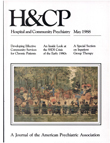Effects of Psychotropic Drugs on Memory: Part 2
Abstract
In these two columns, we have briefly reviewed the research on the effects on memory of lithium, anticonvulsants, anticholinergics, neuroleptics, antidepressants, beta blockers, and benzodiazepines. Evidence suggests that all classes of psychotropic medication may have some deleterious effect on memory. However, the clinician must weigh the risk of memory loss due to psychotropic drugs against the risk that certain emotional illnesses, such as depression and severe anxiety, may themselves impair memory function if not treated.
Clinically significant effects on memory are most often seen when using drugs or combinations of drugs with high anticholinergic activity and when using short-acting benzodiazepines. Clinical evidence and some research suggest that geriatric patients are more sensitive to the potential memory impairment caused by psychotropic drugs, but more research data are needed.
Access content
To read the fulltext, please use one of the options below to sign in or purchase access.- Personal login
- Institutional Login
- Sign in via OpenAthens
- Register for access
-
Please login/register if you wish to pair your device and check access availability.
Not a subscriber?
PsychiatryOnline subscription options offer access to the DSM-5 library, books, journals, CME, and patient resources. This all-in-one virtual library provides psychiatrists and mental health professionals with key resources for diagnosis, treatment, research, and professional development.
Need more help? PsychiatryOnline Customer Service may be reached by emailing [email protected] or by calling 800-368-5777 (in the U.S.) or 703-907-7322 (outside the U.S.).



